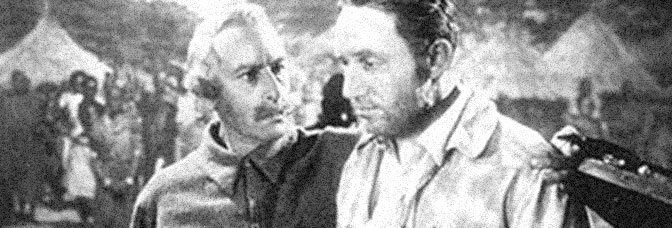There are some beautiful sequences in Stanley and Livingstone, unfortunately, they’re mostly the second unit work from Africa. These sequences–the endless line of men trekking across great expanses–reveal the landscape and wild life of the continent with fervor. Later on, they’re even incorporated into a great rear projection. Spencer Tracy walks from the right of the frame, in front of the screen, to the left, into a physical set. It’s a nice move, probably the best one in the film (but none of the rear projection is shabbily incorporated).
It’s unfortunate the rest of the film comes off so disjointed. Henry King either didn’t shoot enough coverage or editor Barbara McLean simply ignored it for some reason. King’s fine when he’s shooting long shots or unfolding the matter-of-fact narrative (reporter Stanley’s search for Livingstone), but he has real problems when he’s trying to do the tacked-on unrequited romance angle. Or, almost as bad, the awkward, Walter Brennan fueled comedy relief. Brennan’s an American frontier scout in Africa. It’s as funny as it sounds.
The romance, however, reveals the film’s most significant problem. It’s not really about Spencer Tracy. He’s in ninety-five percent of the scenes, but the film tries to explore his personal growth, which isn’t part of the narrative journey. One moment he’s one way, the next he’s different. It’s a revolutionary, absolute and immediate change. The film culminates in a hearing scene–but really a courtroom scene, as it gives Tracy a lengthy monologue–and it’s boring. The climax has a strong dose of deus ex machina and the film visibly strains to bring Tracy into the narrative. He’s been on the sidelines for ten minutes, even though he’s been on screen. It’s a wrong move for the ending; maybe it’s just because the story left Africa, where it was most compelling.
Tracy’s performance is excellent. The script fails him–most of his changes occur during voiceover narration–but he’s still great. As the romantic interest, Nancy Kelly is ineffective. Charles Coburn’s fine as the bad guy, Richard Greene’s amiable as his good-hearted son. Cedric Hardwicke gives a strange performance as the titular Livingstone. He’s going for something and he doesn’t get it, but the failure isn’t absolute and it is interesting to watch. There are a couple moments where he really lets loose and they’re wonderful. Henry Travers is wasted in a manner similar to Brennan.
Some of the film’s problems come from trying to ignore it’s all white man’s burden. In a strange move, the film–in the script–by-passes the evangelical component and promotes the importance of geography… but then concludes with “Onward, Christian Soldiers” playing over Tracy’s African exploration montage.
While the film’s compelling at times–and the production is generally of fine quality–it’s strangely empty and shouldn’t be. It coasts quite a while on the initial good idea before Tracy can’t keep it going on his own anymore.
 ★★
★★
CREDITS
Directed by Henry King; screenplay by Philip Dunne and Julien Josephson, based on historical research and a story by Hal Long and Sam Hellman; director of photography, George Barnes; edited by Barbara McLean; produced by Darryl F. Zanuck; released by 20th Century Fox.
Starring Spencer Tracy (Henry M. Stanley), Nancy Kelly (Eve Kingsley), Richard Greene (Gareth Tyce), Walter Brennan (Jeff Slocum), Charles Coburn (Lord Tyce), Cedric Hardwicke (Dr. David Livingstone), Henry Hull (James Gordon Bennett Jr.), Henry Travers (John Kingsley), Miles Mander (Sir John Gresham), David Torrence (Mr. Cranston), Holmes Herbert (Sir Frederick Holcomb), C. Montague Shaw (Sir Oliver French), Brandon Hurst (Sir Henry Forrester), Hassan Said (Hassan), Paul Harvey (Col. Grimes), Russell Hicks (Peace Commissioner) and Frank Dae (Peace Commissioner).
RELATED

Leave a Reply